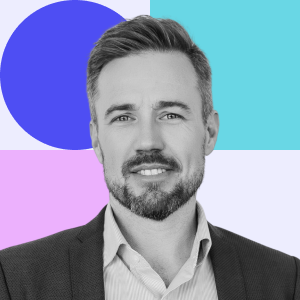I’ve always believed that the best way to improve something is to start with what you can control.
At Joan, we build workplace solutions, so naturally, most of my energy goes into solving workplace problems. But there’s no better place to test bold ideas than your own backyard.
Last year, we tried a four-day workweek. Spoiler: it improved quality across the board and made our team visibly happier, but that’s a story for another time.
This year, we got even bolder. We ran a pilot with true location freedom - not just remote work, not just hybrid schedules, but structured workations that completely change how work feels.
To do it right, we had two different experiences
-
We invited five people from CitizenM, a team we didn’t know personally, to work from our Ljubljana HQ for a week. They didn’t know our routines. We didn’t know theirs. That was the point, to remove bias and see how a new environment affected collaboration, creativity, and team energy.
-
One of our own team members worked from Asia for full 6 months, managing projects, calls, and everything else from a wildly different timezone. That story is coming in the next Joan Magazine issue.
Here’s what happened when we gave people not just permission, but infrastructure, to make work feel different.

It wasn't about the work, and somehow it was
We invited five team members from CitizenM, strangers to us, each with different roles and rhythms, to our Ljubljana HQ for one week. We covered the basics: a place to stay, office space, local experiences. But we didn’t script anything else.
From day one, it felt different. They came from different corners of the organization, some working closely with hotel teams, others more focused on systems and infrastructure. Normally, they wouldn't cross paths beyond a ticket or a thread. But here, in the same room, that separation began to fade. Someone who usually handles on-the-ground tech started asking questions about long-term system strategy. Someone who spends their days deep in property operations suddenly saw how their decisions impacted digital tools at the office level. The conversations weren’t formal. They happened over coffee, in between meetings, during quiet moments in the lounge.
By mid-week, something clicked. The energy wasn’t just higher, it was more open. They were challenging each other’s thinking, filling in blind spots, and building better ideas together. There was no pressure to perform, just permission to be curious. They listened more. Laughed more. Got stuck into problems they didn’t even know they had in common. It wasn’t about who owned what. It was about what made sense, together.
The power of “just different enough.”
We’re conditioned to think that real change requires huge systems or org-wide overhauls. But sometimes, all it takes is a shift in setting, a space that feels fresh enough to wake up different parts of your brain.
You’ve probably felt this yourself: how a café makes you write faster. How a walk in a new neighborhood unlocks a stubborn idea. Workations harness that same principle, intentionally.
They’re not about escape. They’re about designing for energy.
And when we create spaces that inspire, people bring more of themselves to the work. That’s the real ROI.
And here’s where it gets measurable.
According to Deloitte, for every $1 companies invest in employee wellbeing, they see over $4 in return, through higher productivity, lower absenteeism, and better retention.

- The CitizenM team logged more completed tasks than in their average office week.
-
They reported better collaboration and clearer communication.
-
They left not just rested, but re-energized, which is rare for a trip that technically included work.
It wasn’t a vacation. And it wasn’t about taking it easy.
It was about creating just enough difference in environment to trigger fresh thinking and stronger connections.
This wasn’t a perk. It was a prototype.
We didn’t do this to be generous. We did it to learn what might be possible if more companies stopped thinking about flexibility as a policy, and started thinking about it as a design choice.
Could location freedom actually strengthen team connection?
Can creativity improve just by switching context?
And more importantly: how do we make this sustainable, not exceptional?
We don’t have all the answers. But we captured what we learned so far.
🡒 Download the full workation experience report.
Inside, you’ll find:
-
The full story of our week with CitizenM
-
Measurable outcomes (what improved, and what didn’t)
-
Insights you can borrow for your own team
-
Our early framework for scaling workations with structure
Coming next:
In the next edition, we’ll share the story of one of our own team members who worked from Asia for a full month, across time zones, roles, and logistics.
Two experiences. Two different angles. One big idea:
Workplace experience doesn’t start with perks. It starts with possibility.
About the author
Luka Birsa is the co-founder of Joan Workplace, a platform designed to simplify meeting room booking, desk reservations, visitor management, and workplace signage.
Joan started as a meeting room management system but has quickly evolved into an entire suite of productivity-enhancing tools. From desk booking and visitor management to streamlining team collaboration, Joan is designed to help modern workplaces thrive.
.jpg?width=4000&height=2000&name=ISE_2024_PeterG_presenting_Joan-6-RE_16x9_thumbnail%20(13).jpg)
About the author
Luka Birsa is the co-founder of Joan Workplace, a platform designed to simplify meeting room booking, desk reservations, parking and asset booking, visitor management, and workplace digital signage.
Joan started as a meeting room management system but has quickly evolved into an entire suite of productivity-enhancing tools. From desk booking and visitor management to streamlining team collaboration, Joan is designed to help modern workplaces thrive.
Insights that keep your office running smoothly
Fresh content on productivity, space management, and the future of work. Perfect for managers, admins, and busy teams.
Join thousands of workplace professionals who already read the Joan blog. Unsubscribe anytime.
